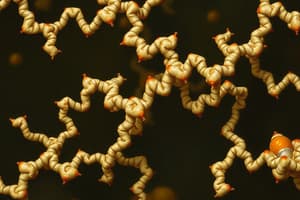Podcast
Questions and Answers
What is the main reason water is considered the best solvent?
What is the main reason water is considered the best solvent?
- Its low density
- Its universal nature (correct)
- Its non-polarity
- Its high salt content
What happens when two atoms with equal electronegativity form a bond?
What happens when two atoms with equal electronegativity form a bond?
- Electrons are shared equally (correct)
- Ionic character is created
- Electrons are not shared
- A covalent bond is not formed
What percentage of the Earth's water is freshwater?
What percentage of the Earth's water is freshwater?
- 71%
- 97.5%
- 2.5% (correct)
- 60%
What is the tendency of an atom to attract electrons to itself called?
What is the tendency of an atom to attract electrons to itself called?
Which bond type occurs when the electronegativity difference between two atoms is more than 1.7?
Which bond type occurs when the electronegativity difference between two atoms is more than 1.7?
Why is water crucial for biochemical processes in living organisms?
Why is water crucial for biochemical processes in living organisms?
What type of bond will have a nonpolar covalent character?
What type of bond will have a nonpolar covalent character?
What determines the polarity of a bond?
What determines the polarity of a bond?
Why are the two C=O bonds in CO2 considered polar?
Why are the two C=O bonds in CO2 considered polar?
In a molecule, why can polar bonds still result in a nonpolar molecule?
In a molecule, why can polar bonds still result in a nonpolar molecule?
What type of bonds have positive and negative ends that create dipoles?
What type of bonds have positive and negative ends that create dipoles?
Why is the bond between oxygen and hydrogen in water considered polar?
Why is the bond between oxygen and hydrogen in water considered polar?
What type of bond is formed between water molecules due to their polarity?
What type of bond is formed between water molecules due to their polarity?
How do hydrogen bonds compare to covalent bonds in terms of strength?
How do hydrogen bonds compare to covalent bonds in terms of strength?
What is the significance of hydrogen bonding in the stabilization of 3-D structures of biological molecules?
What is the significance of hydrogen bonding in the stabilization of 3-D structures of biological molecules?
What type of molecules are described as hydrophilic?
What type of molecules are described as hydrophilic?
In water, what type of substances can easily dissolve due to its polarity?
In water, what type of substances can easily dissolve due to its polarity?
How do amphipathic molecules differ from hydrophilic and hydrophobic molecules?
How do amphipathic molecules differ from hydrophilic and hydrophobic molecules?
Why do some chemicals dissolve in water while others don't?
Why do some chemicals dissolve in water while others don't?
Why are hydrocarbons like full charges compounds such as NaCl and KCl not soluble in water?
Why are hydrocarbons like full charges compounds such as NaCl and KCl not soluble in water?
What happens when oil and water are mixed together?
What happens when oil and water are mixed together?
Why do polar compounds with partial charges dissolve in water effectively?
Why do polar compounds with partial charges dissolve in water effectively?
Why do hydrocarbons not readily dissolve in water?
Why do hydrocarbons not readily dissolve in water?
How do compounds like ethyl alcohol and acetone behave in water?
How do compounds like ethyl alcohol and acetone behave in water?




